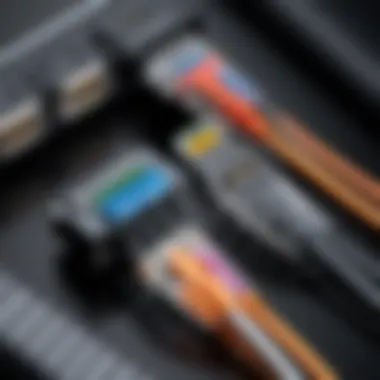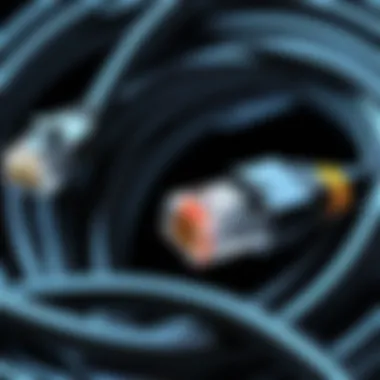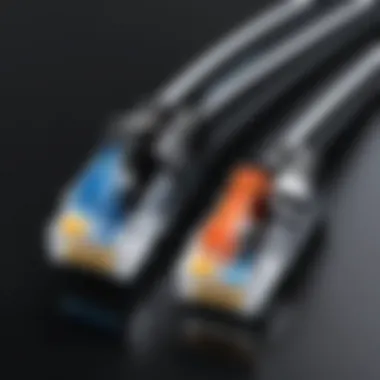Unveiling the In-depth Insights into 6 Pair Cat 5 Cables: A Comprehensive Guide


Understanding Concepts Related to Pair Cat Cable
6 pair Cat 5 cables are ubiquitous in networking scenarios, playing a pivotal role in ensuring seamless data transmission between devices in a network. Understanding the fundamental concepts behind these cables is crucial for anyone delving into the realm of connectivity. These cables comprise six twisted pairs of copper wires, each with specific color-coding for identification. The twists in the pairs help minimize electromagnetic interference, ensuring reliable data flow. By grasping the structure and function of these cables, professionals can optimize network performance and troubleshoot effectively.
Key Terminology and Definitions
To navigate the world of 6 pair Cat 5 cables proficiently, it's essential to familiarize oneself with key terminology and definitions. Terms like 'twisted pair,' 'AWG (American Wire Gauge),' 'RJ45 connector,' and 'Ethernet' form the foundation of understanding these cables. Each term holds significance in the networking domain, impacting how networks communicate and operate. By immersing oneself in these definitions, individuals can speak the language of networking experts and comprehend complex technical discussions with ease.
Overview of Important Concepts and Technologies
6 pair Cat 5 cables stand as a testament to the evolution of networking technologies and concepts. From the inception of Ethernet to the latest advancements in data transfer speeds, these cables have adapted to meet the demands of modern connectivity. Concepts like crosstalk mitigation, data transmission rates, and backward compatibility with older standards underpin the functionality of 6 pair Cat 5 cables. By encapsulating these crucial concepts, professionals can grasp the intricacies of network design, deployment, and maintenance effectively.
Foreword
In the fast-paced world of networking and connectivity, understanding the nuances of 6 pair Cat 5 cables is paramount. This article serves as a beacon of knowledge for tech enthusiasts and professionals alike, delving into the core concepts surrounding these cables. By unraveling their structure, applications, and benefits, readers are bound to enhance their grasp of networking intricacies.
Understanding Cat Cables
The Evolution of Ethernet Cables
The evolution of ethernet cables stands as a testament to the constant innovations driving connectivity. Cat 5 cables have played a pivotal role in this evolution, offering a blend of reliability and efficiency that have withstood the test of time. Their key characteristic lies in providing stable and high-speed connections, making them a popular choice for various networking setups. However, as technology progresses, the limitations of Cat 5 cables in handling ultra-high speeds have become apparent, signaling the need for upgrades in certain scenarios.
The Importance of Cat Cables in Networking
Cat 5 cables hold significant importance in the realm of networking, acting as the backbone of numerous systems worldwide. Their reliability and cost-effectiveness make them a beneficial choice for businesses and homes alike. The unique feature of Cat 5 cables lies in their ability to transmit data efficiently over long distances without compromising signal integrity, making them a preferred option in diverse networking environments. Nevertheless, advancements in technology continue to push the boundaries of networking capabilities, prompting users to evaluate the compatibility of Cat 5 cables with cutting-edge requirements.
Key Features of Cat Cables
When it comes to Cat 5 cables, their key features set them apart in the networking arena. The structured wiring design of Cat 5 cables ensures consistent performance by reducing crosstalk and electromagnetic interference. This feature is particularly beneficial in environments where multiple data streams coexist, as it minimizes signal disruptions. However, the limited bandwidth capacity of Cat 5 cables poses a challenge in high-demand settings, necessitating a thorough assessment of performance requirements before deployment.
Basic Structure of Cat Cables
Composition of Pair Cat Cables
The composition of 6 pair Cat 5 cables embodies a meticulous arrangement of twisted pairs designed to enhance signal integrity. This intricate design facilitates seamless data transmission by minimizing signal degradation, ensuring optimal performance across networking infrastructures. The key characteristic of the composition lies in its ability to support high-speed data transfer while maintaining signal quality, making it an ideal choice for applications demanding consistent connectivity.
Differences from Other Ethernet Cables
Set against other ethernet cables, 6 pair Cat 5 cables boast distinct characteristics that differentiate them in the networking landscape. Unlike Cat 6 or Cat 7 cables, Cat 5 cables offer a balance between performance and cost-efficiency, making them a versatile option for various networking needs. However, their limited capacity to handle higher data speeds compared to newer cable types necessitates a thoughtful evaluation of specific requirements before implementation.
Notable Specifications


In the realm of networking, the specifications of 6 pair Cat 5 cables underscore their capabilities and limitations. From maximum data transmission rates to frequency support, these specifications offer critical insights into the performance expectations of the cables. It is vital for users to be well-versed in these specifications to make informed decisions regarding network setups, ensuring optimized performance and reliability over time.
Applications of Pair Cat Cables
Usage in Home Networks
The utilization of 6 pair Cat 5 cables in home networks simplifies connectivity while maintaining efficient data transfer. Their seamless integration into residential setups enables users to enjoy reliable internet access and streaming services without disruptions. The key characteristic of Cat 5 cables in home networks lies in their ability to bridge multiple devices effortlessly, creating a cohesive network environment for the modern household.
Industrial and Commercial Deployments
In industrial and commercial settings, the deployment of 6 pair Cat 5 cables streamlines networking operations, supporting critical communication processes. Their robust construction and standardized performance ensure uninterrupted data flow in demanding environments. The unique feature of Cat 5 cables in such deployments lies in their capacity to withstand harsh conditions while delivering consistent network performance, underpinning the efficiency of diverse operations.
Advantages in Data Centers
Data centers leverage the advantages of 6 pair Cat 5 cables to uphold efficiency and reliability in massive network infrastructures. These cables facilitate rapid data exchange within server clusters, fostering seamless information flow. The key characteristic of Cat 5 cables in data centers is their ability to handle substantial data traffic without compromising network stability, making them a preferred choice for sustaining critical operations.
Benefits of Using Pair Cat Cables
Enhanced Data Transmission Speeds
The adoption of 6 pair Cat 5 cables heralds enhanced data transmission speeds across network architectures. This significant benefit ensures swift data delivery between connected devices, optimizing network performance. The unique feature of improved data transmission speeds underscores the efficiency of Cat 5 cables in supporting high-bandwidth applications, laying the groundwork for seamless digital experiences.
Improved Signal Quality
Cat 5 cables prioritize signal quality, ensuring a consistent flow of data with minimal interruptions. This focus on signal integrity enhances network reliability by minimizing potential disruptions during data transmission. The key characteristic of improved signal quality distinguishes Cat 5 cables as a reliable networking solution, fostering stable connections in varying usage scenarios.
Reliability and Durability
Reliability and durability are hallmarks of 6 pair Cat 5 cables, showcasing their resilience in diverse networking environments. Their robust construction and superior insulation translate to prolonged operational lifespans, minimizing the need for frequent replacements. The unique feature of reliability and durability positions Cat 5 cables as dependable networking assets, capable of withstanding demanding conditions with unwavering performance.
Comparative Analysis with Other Cable Types
Distinguishing Factors from Cat Cables
When comparing Cat 5 cables to Cat 6 counterparts, notable distinguishing factors come to light. Cat 6 cables excel in supporting higher data speeds and bandwidth capacities, outperforming Cat 5 cables in demanding networking scenarios. However, the cost-effectiveness of Cat 5 cables remains an attractive feature for users seeking efficient connectivity solutions without exorbitant expenses.
Performance Contrasts with Cat Cables
In contrast to Cat 7 cables, Cat 5 cables exhibit variances in performance capabilities, particularly concerning data transmission speeds and frequency support. While Cat 7 cables offer enhanced performance for advanced networking needs, Cat 5 cables remain a pragmatic choice for standard network setups requiring reliable connectivity. The decision between these cable types hinges on specific requirements and budget considerations.
Cost-Effectiveness Vis-a-vis Fiber Optic Cables


Evaluating the cost-effectiveness of Cat 5 cables against fiber optic alternatives showcases distinctive benefits and trade-offs. While fiber optic cables excel in transmitting data over long distances at high speeds, Cat 5 cables provide a balanced approach to network connectivity at a more economical price point. The unique feature of cost-effectiveness positions Cat 5 cables as a practical choice for users prioritizing affordability without compromising essential networking functionalities.
Installation and Maintenance Tips
Proper Handling and Cable Management
Proper handling and cable management are essential aspects of optimizing the performance of 6 pair Cat 5 cables. Careful installation techniques and efficient cable organization contribute to sustained data transmission quality, reducing the risk of signal interference. The key characteristic of proper handling lies in preserving cable integrity, ensuring prolonged functionality and minimizing maintenance requirements.
Troubleshooting Common Issues
Being adept at troubleshooting common issues is crucial for maintaining a seamless networking experience with Cat 5 cables. Identifying and resolving connectivity disruptions promptly can prevent downtime and optimize network performance. The unique feature of troubleshooting common issues underscores the importance of proactive network monitoring and swift problem resolution, guaranteeing uninterrupted connectivity for users.
Longevity and Suggested Replacement Cycles
Understanding the longevity and suggested replacement cycles of Cat 5 cables is vital for sustaining network efficiency over time. While Cat 5 cables exhibit durability, periodic assessments for wear and tear are advisable to preempt potential failures. The key characteristic of longevity highlights the extended operational lifespan of Cat 5 cables, accompanied by suggested replacement cycles to uphold performance standards and adapt to evolving networking demands.
Innovations and Future Prospects
In today's rapidly evolving technological landscape, staying ahead of emerging trends is paramount. For this article on 6 Pair Cat 5 cables, delving into the realm of Innovations and Future Prospects sheds light on the trajectory of networking solutions. Understanding the dynamics of networking advancements is crucial for IT professionals, cybersecurity experts, and students alike. By exploring the latest trends, readers can gain a competitive edge in optimizing connectivity and data transmission processes.
Emerging Trends in Networking
5G Integration
In the domain of networking, 5G Integration stands out as a pivotal development. Its seamless compatibility with 6 Pair Cat 5 cables is a game-changer, propelling connectivity speeds to unprecedented levels. The efficiency of 5G Integration in enhancing data transmission aligns perfectly with the goals of this article. Despite its advantages, the deployment of 5G Integration also comes with certain limitations, warranting a nuanced approach to integration within the context discussed here.
Internet of Things (IoT) Applications
The fusion of Cat 5 cables with Internet of Things (IoT) Applications opens up a world of interconnected possibilities. Leveraging the power of IoT in conjunction with Cat 5 cables revolutionizes how networks operate. The practical applications of this synergy cater to a wide array of industries, making it a pivotal focus within this narrative. However, delving into IoT Applications necessitates a thorough examination of potential vulnerabilities to ensure a holistic understanding.
Smart Home Connectivity
In the era of smart technologies, Smart Home Connectivity plays a crucial role in molding the future of networking. Integrating Cat 5 cables into smart home setups enhances efficiency and reliability, fostering seamless communication between devices. The interplay between Smart Home Connectivity and Cat 5 cables underscores the importance of connectivity standards in modern living spaces. Analyzing the advantages and challenges of this amalgamation provides invaluable insights for professionals and enthusiasts alike.
Research and Development Frontiers
Advancements in Cable Technology
The continual evolution of Cable Technology is instrumental in shaping the networking landscape. From enhanced data speeds to improved signal quality, each advancement in cable technology introduces new possibilities. Within the context of this article, highlighting the features and functionalities of advanced cables elucidates the significance of integrating cutting-edge components into network infrastructures.
Potential Impact of Quantum Computing


The advent of Quantum Computing poses both opportunities and challenges for networking enthusiasts. Understanding the transformative potential of quantum technologies in the realm of Cat 5 cables is crucial for staying abreast of future networking horizons. While Quantum Computing promises unparalleled processing power, its integration with existing network infrastructures requires meticulous consideration to harness its full potential.
Future-proofing Network Infrastructures
Future-proofing network infrastructures is a strategic imperative in the dynamic landscape of networking. By ensuring scalability, flexibility, and adaptability, network infrastructures can withstand the test of time. Exploring the strategies and technologies that facilitate future-proofing provides readers with a roadmap for sustainable network development. While the benefits are clear, challenges in implementation underscore the complexities involved in safeguarding network infrastructures for the long haul.
Sustainability and Green Networking
Eco-friendly Materials in Cable Manufacturing
The shift towards eco-friendly materials in cable manufacturing signifies a paradigm shift in sustainability practices. Integrating environmentally conscious materials into Cat 5 cables reflects a commitment to reducing ecological footprints. Exploring the implications and benefits of eco-friendly materials offers a holistic perspective on the intersection of technology and environmental stewardship.
Energy-Efficient Connectivity Solutions
Amid escalating energy demands, Energy-Efficient Connectivity Solutions emerge as a beacon of efficiency. Balancing performance with energy conservation, these solutions align with the ethos of sustainable networking practices. Assessing the trade-offs and advantages of energy-efficient connectivity solutions underscores their pivotal role in optimizing resource utilization within the scope of this article.
Carbon Footprint Reduction Strategies
Mitigating carbon footprints is a collective responsibility, with networking technologies playing a significant role in this endeavor. Implementing robust strategies for reducing carbon footprints in networking operations requires a multi-faceted approach. By elucidating the advantages and challenges of carbon footprint reduction strategies, this article equips readers with the knowledge needed to navigate the sustainability landscape within the realm of Cat 5 cables.
Culmination
Key Takeaways
The Significance of Pair Cat Cables
Exploring the significance of 6 Pair Cat 5 Cables unveils a fundamental pillar in network architecture. Their robust design and ability to handle high data transmission speeds make them indispensable in various networking environments. The structured wiring of Cat 5 Cables ensures minimal interference, promoting stable and secure connectivity. A notable characteristic of these cables lies in their cost-efficient nature without compromising on performance, making them a viable choice for both residential and commercial networking setups.
Implications for Future Networking Trends
The implications of Cat 5 Cables extend far beyond the present technological landscape. By laying the groundwork for stable data transmission, these cables play a pivotal role in shaping future connectivity trends. Their compatibility with emerging technologies like IoT and 5G sets a solid foundation for the interconnected world of tomorrow. As networking demands evolve, Cat 5 Cables prove to be adaptable and future-proof solutions that align with the trajectory of technological advancements.
Practical Recommendations for Users
Offering practical recommendations for Cat 5 Cable users emphasizes the importance of proper installation and maintenance practices. Users are encouraged to adhere to industry standards when deploying these cables to maximize their efficiency and lifespan. Implementing cable management strategies and periodic maintenance checks can enhance the longevity and performance of Cat 5 Cables. Additionally, staying informed about upgrade cycles and advancements in cable technology equips users to optimize their network infrastructure effectively.
Closing Thoughts
Continual Evolution of Networking Standards
The landscape of networking standards continues to evolve, driven by the demand for faster and more reliable connections. The adaptability of Cat 5 Cables to meet these evolving standards showcases their enduring relevance in the ever-changing tech industry. As new networking protocols emerge, Cat 5 Cables demonstrate a remarkable capacity to integrate seamlessly, ensuring consistent performance across diverse networking environments.
The Role of Cat Cables in Connectivity
Cat 5 Cables play a pivotal role in establishing robust connectivity frameworks across various settings, from homes to large enterprises. Their proven track record in facilitating high-speed data transmission and maintaining signal integrity underscores their importance in modern connectivity solutions. Recognizing the role of Cat 5 Cables as the backbone of reliable communication networks is essential for fostering uninterrupted data flow and network stability.
Innovation Driving Technological Progress
The relentless pursuit of innovation in cable technology propels the tech industry forward, with Cat 5 Cables serving as stalwarts in this journey. The ongoing advancements in cable design and functionality reflect a commitment to enhancing connectivity solutions for a wide range of applications. By integrating cutting-edge innovations into Cat 5 Cable technology, industry players set the stage for continued technological progress, empowering users with efficient and sustainable networking solutions.



